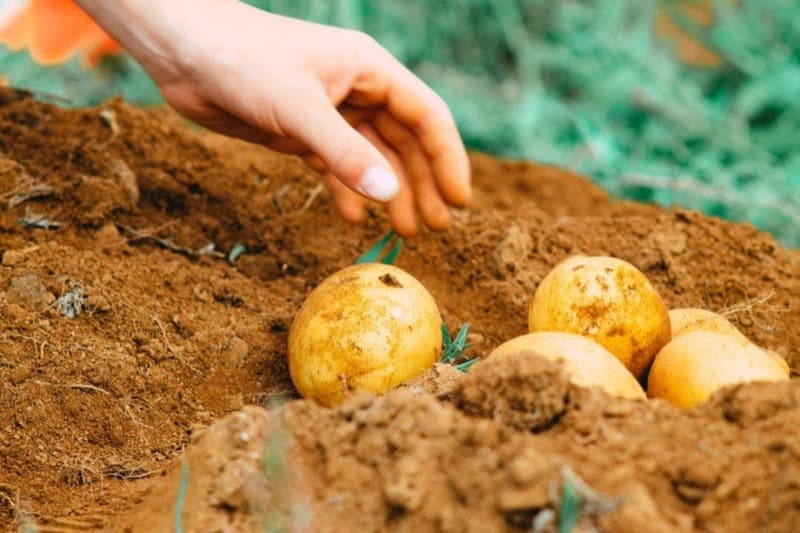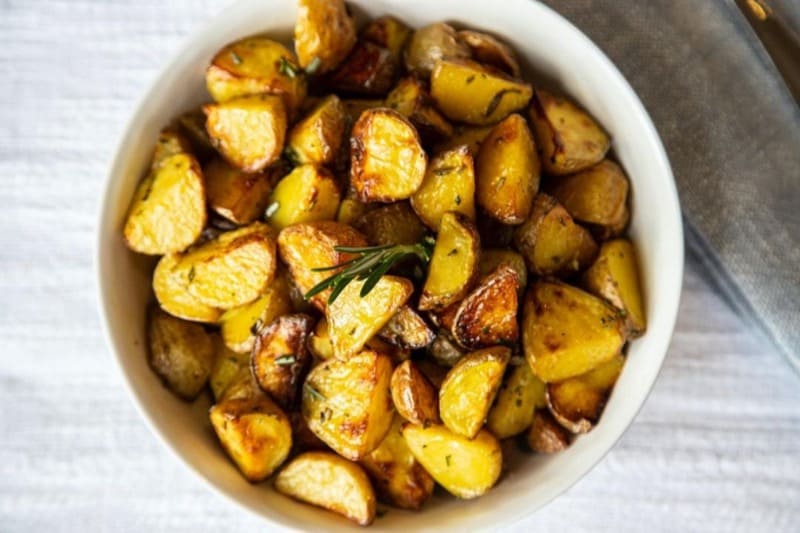Potatoes are a vegetable, not a fruit. They are also delicious, nutritious, and versatile.
Native to South America, it is believed that the Inca were the first to cultivate potatoes as far back as 8000 BC. Thanks to the Spaniards and the Irish, potatoes became a global phenomenon in the 1500s.
They are now one of the world’s staple foods with over a third of all potatoes cultivated in India and China.
This article will get more into the details of what makes a potato a vegetable and not a fruit, different types of potatoes, and its many health benefits.
- Related article: What’s the Difference Between a Fruit and Vegetable?
Is Potato a Fruit or a Vegetable?
Grown as annuals for their edible root parts, potatoes are vegetables and more specifically, they are a root vegetable or tuber. These vegetables are not the actual potato roots, but grow from the plant’s root system.
A part of the perennial Solanum tuberosum plant, they belong to the nightshade family known as Solanaceae. Potato plants are native to the Americas, but cultivated and consumed globally.

Why Are Potatoes Not Fruit?
Potatoes are not fruit, even though the potato plant itself does produce fruit. The plant’s fruit resembles a cherry tomato and is quite toxic.
Unlike fruits, which develop after flowering, these tubers grow underground along with the root system.
Potatoes contain no seeds and will grow on the roots whether the potato plant has been successfully pollinated or not, as the plant’s flowers are unimportant to the development of the tuber.
Are Potatoes a Starch?
The United States Department of Agriculture divides vegetables into five different subcategories:
- Beans and peas
- Dark green vegetables
- Red and orange vegetables
- Starchy vegetables
- Other kinds of vegetables
Potatoes are classified as starchy vegetables because they contain more starch than the vegetables in the other categories. Starch is one type of carbohydrate, and carbohydrates are an essential part of a healthy diet because they provide much-needed energy.
Carbs are divided into simple and complex carbohydrates. Sugar is a simple carbohydrate. Potatoes and other starchy foods consist of joined sugar molecules, so they are considered a complex carbohydrate.
6 Common Types of Potatoes
With more than 4,000 varieties of potato in existence, it would be difficult to provide a comprehensive guide to all potato types, but there are several popular types that every potato lover should know and try.
1. Russet Potatoes
Often referred to as Idaho potatoes, Burbank, or Baker’s potatoes, they come in a grayish-brown skin. When cooked properly, the potato texture is light and fluffy, with a chewy skin.
Idaho potatoes are ideal for baking, mashing, or roasting.
2. Red Potatoes
Also known as Redskin or Red Bless potatoes, this is a waxy variety that will maintain its shape after having been cooked.
The skin is red in color and very thin so that they are often not peeled when used in recipes. The potato itself is dense and boasts bright white flesh once cooked.
Red potatoes are great for roasting, soups, and potato salad.
3. White Potatoes
The pale skin and flesh of the White Potato is the source of its name. Similar to russet potatoes in texture and flavor, the skin is much thinner and often these tubers are not peeled when used.
White potatoes are a lovely choice for boiling, frying, mashing, or roasting.
4. Yellow Potatoes
Velvety smooth and buttery, the yellow potato is an exceptionally popular choice of potato. Its skin is on the thin side, so they crisp nicely when roasted or fried.
You may find them under the name of Golden Potatoes too. They are delicious when boiled, fried, mashed, or roasted.
5. Purple Potatoes
Boasting dark purple skin and a lavender-hued fleshy inside, the Purple Potato variety is higher in vitamin content than some of the other potato varieties because of their deep coloring.
The potato flesh may seem floury with an earthy taste and offers a high starch content. Perfect for baking, boiling, and roasting.
6. Sweet Potatoes
Technically, Sweet Potatoes are root vegetables, but they are not like regular potatoes. Although they are root vegetables, they are not classified as tubers, even if they also belong to the nightshade family.
The sweet potato skin has a reddish-orange color that is much tougher, so sweet potato recipes will call for peeling either before or after cooking.
The inner flesh is a bright orange hue that is sweet to the taste and features a creamy texture. The sweet flavor is a reason that some people will call sweet potatoes a fruit in a culinary classification, but they’re still not a fruit in that sense.
The sweet potato works well in both sweet and savory recipes. A delightful addition to your menu when baked, mashed or roasted.
Read the in-depth guide – Is Sweet Potato a Vegetable or Fruit?

7 Health Benefits of Potatoes
This versatile root vegetable is a staple in many homes across the globe and offers a surprising number of nutritional and health benefits. Here are a few of the many extraordinary benefits that accompany consuming potatoes in your diet.
1. Potatoes are Packed Full of Nutrients and Vitamins
The nutritional value will vary depending on the variety of potatoes that you select and will also be influenced by the way you prepare them. For example, if they are fried, they will increase in fat content and calories.
Potato skins contain a good portion of the vitamins and nutrients associated with this tuber, so if you peel them, you will lose some of the nutritional value.
Consider that a medium-sized baked potato with skin that weighs about 170 grams, its nutritional content will include:
- 36.6g of Carbohydrates
- 0.2g of Fat
- 3.8g of Fiber
- 4.3g of Protein
- Folate: 12% Required Daily Intake (RDI)
- Magnesium: 12% RDI
- Manganese: 19% RDI
- Niacin: 12% RDI
- Phosphorous: 12% RDI
- Potassium: 26% RDI
- Vitamin B6: 27% RDI
- Vitamin C: 28% RDI
Potatoes also contain about 17% starch. Avoid eating sprouted tubers, as starch may convert to sugar and lose some of its nutritional value.
2. Potatoes Contain Antioxidants
Rich in carotenoids, flavonoids, and phenolic acid, these antioxidant compounds block and neutralize harmful free radicals.
Those same harmful radicals can accumulate and increase the risk of diseases, such as cancer, diabetes, and heart disease.
3. Potatoes Do Not Contain Gluten
For those with a gluten intolerance or have celiac disease, and need a gluten-free diet, the potato is a great alternative as they are naturally devoid of gluten.
4. Potatoes Can Facilitate Digestion
Potatoes are predominantly complex carbs, so they are much easier to digest and a great option for those unable to digest harder foods. They’ll also provide more needed energy.
5. Potatoes are High in Fiber
Containing a good amount of fiber, the potato may assist with digestion and prevent constipation. Fiber will help with clearing out cholesterol from your veins and arteries.
6. Potatoes May Aid in Controlling Blood Pressure
Many causes can be a source of high blood pressure, including diabetes, stress, obesity, and indigestion. The potassium content in potatoes sits at about 46% of RDI and may aid in lowering blood pressure because it works as a vasodilator.
7. Potatoes Have a Low Caloric Value
While aiding in staving off hunger leaving you feeling full, potatoes will also have a low caloric value when eaten without the cheese and butter – stay away from the loaded baked potatoes.
They can contribute to lowering cholesterol, because they are half soluble and half insoluble fiber.
Potatoes are Vegetables Final Thoughts
Although potatoes often get a raw deal because they are linked to weight gain, it’s the preparation that influences the caloric content and not the tuber vegetable itself. When taking into account all the nutritional value, this is a superfood of a vegetable!
Here are other articles you may be interested in:

